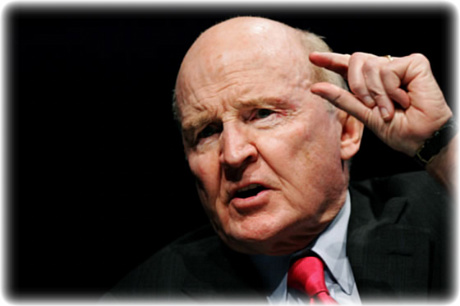
가장 성공적인 CEO로 칭송 받는 잭 웰치 전 GE 회장이 말하는 CEO가 되는 7가지 법칙입니다.
비록, CEO로서 웰치 회장에 대한 비난이 많은 것도 사실입니다만, 그의 원리/원칙에서 리더로서의 자세에 대해 많은 것을 배울 수 있지 않을까 합니다.
1. 정직하고 단도직입적이 되라 (Tell it straight.)
- 정직하게 고객, 공급자, 증권분석가, 경쟁자 그리고 정부에 현실을 말하라.
2. 자신을 조율하라 (Set the tone.)
- 늘 지켜보는 사람들에게 자신의 존재감을 느끼도록 하고 자신의 의도를 알 수있게 하라.
3. 지식을 최대화하라 (Maximize intellect.)
- 직원들의 마음을 얻는 것이 가장 중요하다. 그들의 아이디어를 끊임없이 들어주면서 자신의 지식을 최대화하라.
4. 사람 먼저, 그리고 전략을 다음으로 (Put people first, strategy second.)
- 적절한 인재를 적절한 Job에 배정하는 것이 전략보다 중요하다.
5. 열정을 보여라 (Show Passion)
- 열정이란 큰소리로 떠들거나 근거없는 자신감이 아니다. 자신의 내면 깊은 곳에서 우러나오는 그 무엇인가다.
6. 더 많이 칭찬하라 (Celebrate more.)
- 일 한다는 것은 단지 직업만이 아니다. 일하는 것이 즐겁도록 늘 더 많이 칭찬하라.
7. 끊임없이 평가하라 (Conduct appraisals all the time.)
- 나는 매일 늦은 밤까지 직원들에게 우리가 지금 어느 위치에 있는지, 내가 무엇을 원하는지, 함께 무엇을 할 수 있을지에 대해 손으로 직접 써서 전달한다.
[Translated by J.H.Choi,]
Seven Principles
[Source: http://www.eep2.com/images/chalk/0905/020905.htm]
There’s no magic formula to being a CEO, but here are seven ideas that worked for me.
 |
1. Tell it straight.
People may not have agreed with me on every issue—and I may not have been right all the time—but they always knew they were getting it straight and honest. Candor builds better relationships with customers, suppliers, analysts, competitors, and governments. I never had two agendas. There was only one way—the straight way.
2. Set the tone.
The organization takes its cue from the person on top. Your personal intensity determines your team’s intensity. How hard you work and how many people you touch will be emulated thousands of times over. You set the tone. Every day, I tried to get into the skin of every person in the place. I wanted them to feel my presence. I would lead exchanges with other leaders to understand their concerns so they could understand mine. I didn’t want to be a picture in the annual report. I wanted to be someone who everyone knew.
3. Maximize intellect.
Getting every employee’s mind into the game is a huge part of what the CEO does. I would take everyone’s best ideas and transfer them to others. I tried to be a sponge, absorbing and questioning every good idea and being open to the best of what everyone, everywhere, had to offer. I would then transfer that learning. Work-Out drove boundaryless behavior and developed the ideas. We rigorously evaluated everyone on this value to reinforce its importance. Searching for a better way and sharing new knowledge brought out the best in everyone.
4. Put people first, strategy second.
Getting the right people in the right jobs is a lot more important than developing a strategy. I sat in rooms for years, looking at promising strategies that never delivered results. Service was always a second-class citizen until we put service leaders in place. We learned that we could have the greatest strategies in the world. Without the right leaders developing and owning them, we’d get good-looking presentations and so-so results.
5. Show passion.
Passion defines an A player. For me, intensity covers a lot of sins. Winners care more than anyone else. No detail is too small to sweat or too large to dream. I always look for this characteristic in leaders. Passion doesn’t mean being loud or flamboyant. It’s something that comes from deep inside. Great teams ignite passion.
6. Celebrate more.
Business has to be fun. For too many people, it’s “just a job.” Celebrations are a great way to energize a team or organization. I always looked for ways to celebrate even the smallest victories. I’d often ask our managers, “Are you celebrating enough?” If they said “no,” I’d say, “I can’t celebrate for you. We’re not going to have a VP of celebrations here. You have to be the manager of celebrations. Go make it happen. Make sure your team is having fun—while they’re being productive. Measure and reward the specific behavior you want.”
7. Conduct appraisals all the time.
In a meritocracy, nothing is more important than appraisals. I was giving appraisals all the time—whether I handed out a stock option, gave a raise, or bumped into someone in the hallway. I always wanted people to know where they stood. Every year, I’d send a handwritten note to my direct reports, outlining what I was looking for in the coming year, and attach to it the prior year’s letter to give continuity to the process. My direct reports realized that there would be follow-up—and that I cared a lot. The process was time-consuming, and sometimes late at night, I would wish I hadn’t started it, but it was great discipline. LE
'Meditation on Korean Leadership > 1.Leadership Anecdote' 카테고리의 다른 글
| 리더에게 있어서 우둔함의 중요성 (Leadership from Stupidity) (3) | 2008.10.19 |
|---|---|
| 뮤지컬 캣츠, 오페라의 유령 안무가 '질리안 린' 이야기 (0) | 2008.08.05 |
| 10:20:70 법칙 (리더십개발 원칙) (2) | 2008.08.03 |
| 리더십의 핵심, 동기부여: 원효대사 이야기 (2) | 2008.08.02 |
| 제인 구달 박사 사례로 보는 역발상 리더십 (4) | 2008.08.01 |



댓글